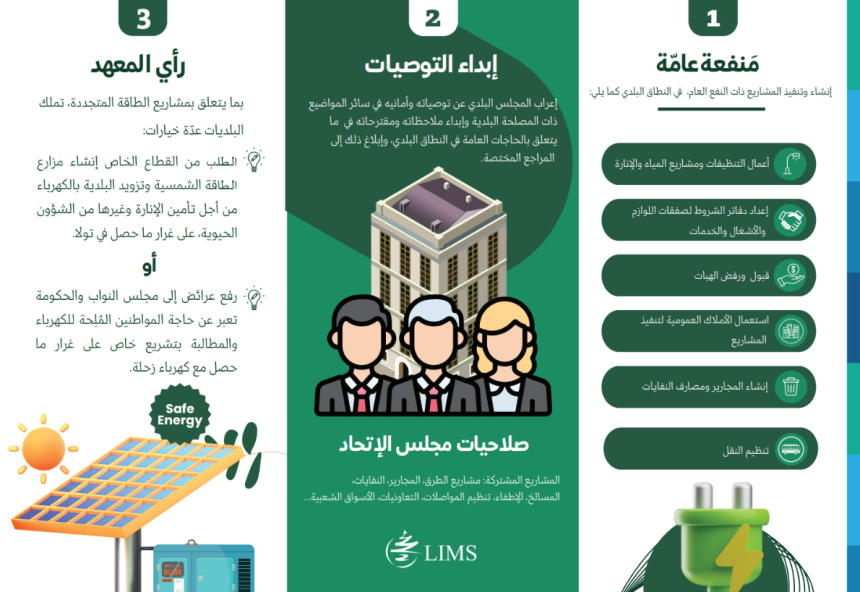Lebanese municipalities have been thrust into the frontline of addressing the fallout of war, grappling with the needs of local residents and displaced populations despite limited resources. The challenges are exacerbated by years of currency devaluation and the government’s discretionary use of the Municipal Fund, leaving municipalities critically underfunded.
In response, LIMS released a pamphlet under its PRISM program, providing actionable guidance for municipalities and businesses on navigating the legal framework to empower private sector involvement in delivering essential services. The focus is on renewable energy and waste management—two pressing areas of need. The guide consolidates key policy recommendations LIMS has championed in the media and highlights successful case studies from North Lebanon, the Beqaa, and Metn regions. These case studies present replicable models for enhancing local service delivery, offering a blueprint for municipalities nationwide to address urgent challenges through innovative and collaborative approaches.
In renewable energy, the pamphlet presents two models for integrating the private sector into the delivery of renewable energy. The first approach follows the example of Toula in North Lebanon, where a private entity obtains municipal permission to establish a solar farm. The farm completes a downloadable form from the Ministry of Energy and Water’s website, detailing the project’s technical specifications. Approval of the technical specifications is generally swift, enabling the solar farm’s construction. Electricity distribution then leverages the existing private generator microgrid. In Toula’s case, the solar farm also managed consolidated billing for both generator-sourced and solar electricity, streamlining the payment process for users.
The second option is to follow the experience of Zahle in the Bekaa valley where a private company and the municipality collaborate on an advocacy campaign engaging the local community and the residents. The campaign aims to obtain a law from the parliament permitting the production and distribution of electricity on the local level. As a result, Zahleh obtained Law 107/2018 allowing a Electricte de Zahle to operate in coordination with Electricité du Liban.
Regarding waste management, the pamphlet addresses the limitations of the pre-crisis model, where municipalities either managed waste collection and transportation to landfills directly or paid private companies to do it. Given municipalities’ current financial constraints, this payment model is no longer sustainable. The pamphlet outlines five recommended reforms for improving waste management at the municipal level: (1) Municipalities should remove public garbage containers from public space; (2) Municipalities should facilitate collection of waste directly from the source (households, businesses, etc.); (3) Households should be able to choose their preferred waste management company; (4) Subscribers, rather than municipalities, should pay companies directly for their services; (5) Private companies should be aided to sell part of the collected waste to specialized recycling companies.
| Click here to read the Arabic version of Pamphlet |
- The War Strangles Municipalities: Resources Are Depleted! November 15, 2024: Lebanon24: Article (AR)

